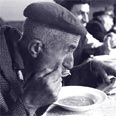


The worldwide economic downturn has left the humanitarian aid organizations that assist Jews in the Eastern Bloc scrambling for resources in recent years. Representatives of these foundations, including the International Fellowship of Christians and Jews, the Joint Distribution Committee, Chabad, the Jewish Agency, as well as the Israeli Education Ministry, gathered for an emergency conference last week to devise a strategic plan to relieve the hardships of the Jews in that part of the world.
'We prioritize the sick over the hungry'
The American Jewish Joint Distribution Committee, the humanitarian organization that supports elderly Jews reported that it had to cut down the number of aid recipients from 200,000 to 150,000 this year - leaving a quarter of the senior population without basic assistance.
"We are forced to distribute less of everything," said Asher Ostrin, the executive director of Former Soviet Union Programs at JDC. "The needs are growing, but the budget isn't."
According to Ostrin, the Jewish population in that part of the world is growing older and poorer. Since the governments do not provide their senior citizens with more than a meager pension, many of them live in poverty, unable to pay for medicine and medical services.
The JDC is forced to prioritize people who are seriously ill over those who don't have food or medicine. "If the condition of an elderly person deteriorates and he needs assistance, it will unfortunately come at the expense of another elderly person," Ostrin said. "Food and medicine supply is less urgent than a person lying alone at home, about to die."
'School closings will leave orphans homeless'
The lack in funds is plaguing the younger population as well. Heftziba, the Jewish Agency's school network that provides Jewish education to thousands of kids, many of whom are needy, has recently found itself on shaky financial grounds. The Israeli government, which used to provide an annual NIS 80 million ($22.4 million) for the schools, had reduced the budget in recent years to NIS 20 million ($5.6 million). The International Fellowship of Christians and Jews has stepped in to help, but these efforts are not enough.
"You must understand that the schools in Eastern Europe are not just educational institutions," said Rabbi Yechiel Eckstein, who heads the fellowship. "There are many orphaned children there who don't have homes. Without this school, they will be thrown out on the street.
"What I don't understand is, do the Jews in Israel and around the world not understand the grave state of the Jews there – or do they not care?" he added. "When I see these difficult conditions, I don't understand how no one comes to help them."
- Follow Ynetnews on Facebook















